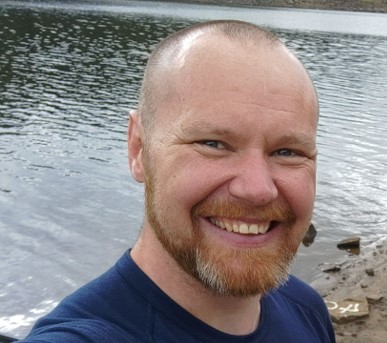Jack Edwards
Senior Technician
School of Applied Sciences
After my moment of crisis, I talked to friends and family, I saw a counsellor and with time I started to look at things with a different viewpoint.
How my view of male mental health changed
I wanted to write this short blog because of who I am on paper and the demographic I fall into. I’m a straight, middle-aged, white British male from a middle-income background with a good education, strong family bonds and no trauma in my past….and I fell apart.
I started a job (with a past employer) that was sold as challenging, it then became demanding and eventually impossible. The hours were long, the support was minimal, and the conditions were without thought to people as anything other than a resource to be used up and disposed of. Going into it I was fit, healthy and keen to progress. It only took 6 months for it to grind me down to the point of crying at my desk, dreading getting up to go to work and eventually breaking down in a doctor’s office and being signed off work. I don’t say this to illicit pity but by way of saying that before it, I would have never thought of myself as someone this could happen to. I believed myself to be strong and believed I could rise to any challenge and that to fail at anything was my own responsibility and fault. So, when I did fail, it crushed me, my sense of self-worth and confidence utterly collapsed, and I had no idea of how to deal with it.
But I was lucky, I had a safety net, a loving family and friends who looked after me and savings to help me through changing jobs. After my moment of crisis, I talked to friends and family, I saw a counsellor and with time I started to look at things with a different viewpoint.
Talking to others helped me step outside the situation I was in and with their help I could see that there were warning signs of things going badly but I hadn’t noticed them, in part because I didn’t know to look for them and in part because they weren’t highlighted by others. Over time I engaged much more with concepts of mental health, initially to deal with my own issues but that built as I saw others walking down paths that I had trodden. I became a mental health first aider to try and help, I attended and delivered workshops focussed on resilience and wellbeing and I shifted away from my old view of individually carrying a burden to a more collective community view of support.
It’s very much a journey and 7 years on I still have moments where I feel something is too much or that I’m not capable but when this does happen, I am much more likely to try to talk about it or ask for help. It doesn’t always happen, and I still slip into old pathways of thought but more and more I am folding those negatives into a more forward-looking idea of growth rather than trying to cut them away entirely.
My sense of confidence and self-worth now are much different than they were. Before my struggle I would have said I was bolder and confident, but it was untested and with that fragile. Now while I feel more tentative at times, I also feel more resilient in myself and able to reach for help when I need without guilt.
Learning from your past and growing with it is hard and demanding but ultimately, I think I have become a more understanding person and while I wish I had come to that place by a different route the results I feel are rewarding and purposeful”

